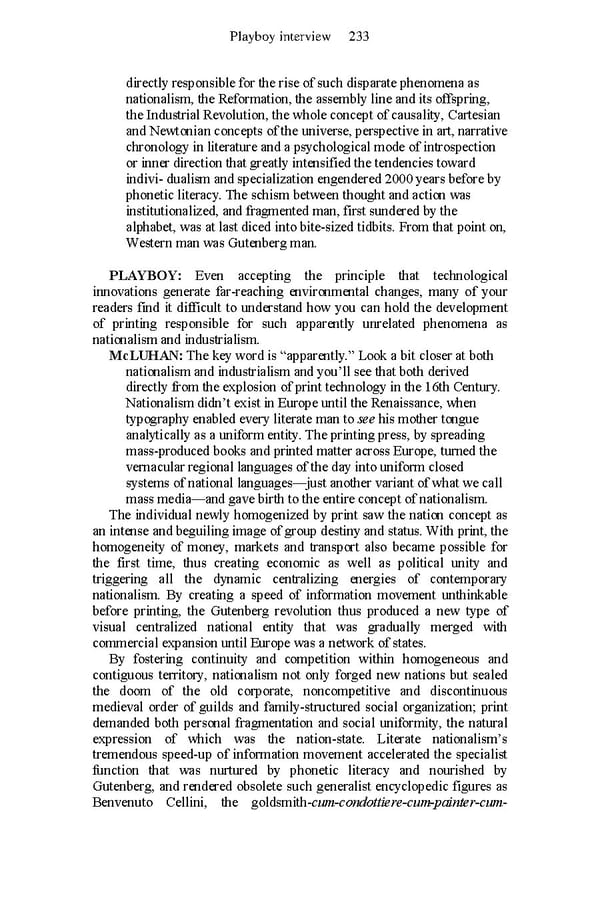Playboy interview 233 directly responsible for the rise of such disparate phenomena as nationalism, the Reformation, the assembly line and its offspring, the Industrial Revolution, the whole concept of causality, Cartesian and Newtonian concepts of the universe, perspective in art, narrative chronology in literature and a psychological mode of introspection or inner direction that greatly intensified the tendencies toward indivi- dualism and specialization engendered 2000 years before by phonetic literacy. The schism between thought and action was institutionalized, and fragmented man, first sundered by the alphabet, was at last diced into bite-sized tidbits. From that point on, Western man was Gutenberg man. PLAYBOY: Even accepting the principle that technological innovations generate far-reaching environmental changes, many of your readers find it difficult to understand how you can hold the development of printing responsible for such apparently unrelated phenomena as nationalism and industrialism. McLUHAN: The key word is “apparently.” Look a bit closer at both nationalism and industrialism and you’ll see that both derived directly from the explosion of print technology in the 16th Century. Nationalism didn’t exist in Europe until the Renaissance, when typography enabled every literate man to see his mother tongue analytically as a uniform entity. The printing press, by spreading mass-produced books and printed matter across Europe, turned the vernacular regional languages of the day into uniform closed systems of national languages—just another variant of what we call mass media—and gave birth to the entire concept of nationalism. The individual newly homogenized by print saw the nation concept as an intense and beguiling image of group destiny and status. With print, the homogeneity of money, markets and transport also became possible for the first time, thus creating economic as well as political unity and triggering all the dynamic centralizing energies of contemporary nationalism. By creating a speed of information movement unthinkable before printing, the Gutenberg revolution thus produced a new type of visual centralized national entity that was gradually merged with commercial expansion until Europe was a network of states. By fostering continuity and competition within homogeneous and contiguous territory, nationalism not only forged new nations but sealed the doom of the old corporate, noncompetitive and discontinuous medieval order of guilds and family-structured social organization; print demanded both personal fragmentation and social uniformity, the natural expression of which was the nation-state. Literate nationalism’s tremendous speed-up of information movement accelerated the specialist function that was nurtured by phonetic literacy and nourished by Gutenberg, and rendered obsolete such generalist encyclopedic figures as Benvenuto Cellini, the goldsmith-cum-condottiere-cum-painter-cum-
 Essential McLuhan Page 239 Page 241
Essential McLuhan Page 239 Page 241